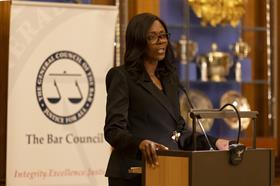The judiciary must publicly acknowledge the problem of bullying by judges, a much awaited report says today. Harriet Harman's independent review of bullying, harassment and sexual harassment at the bar makes 36 recommendations including the appointment of a commissioner and, mandatory anti-bullying and anti-harassment standards.
The former long-serving MP and minister also suggests audio recordings be made of proceedings which would be made available to professional court users to improve accountability. She suggests that the Bar Standards Board talks to the Solicitors Regulation Authority about its 'explicitly clear' code of conduct covering bullying and harassment.
Referring to judicial bullying, Harman said: ‘It is surprising that despite concerns being raised for many years, the judiciary has yet to plainly and explicitly acknowledge that there are some judges who act in a way which undermines the reputation of all those in judicial office by bullying barristers in their courts.’
The independence of the judiciary has ‘contributed to there being little to no accountability for judicial conduct in the courtroom’, the report states. Barristers would benefit from access to an independent court monitor who could attend hearings to observe behaviour.
Harman said during her review she received ‘abundant, disturbing and compelling accounts of judicial bullying’. Although the majority of judges behaved professionally, there are ‘particular judges who are widely known for making everyone’s lives a misery’. In most cases, the review notes, no complaints had been made ‘for fear of repercussions’.
Read more
The review states: ‘The judiciary has not, to date, expressly acknowledged that there is in fact a problem of judicial bullying of members of the bar. In my view, any apparent scepticism as to the credibility of the accounts of bullying simply cannot stand in the face of the discrete accounts of judicial bullying behaviour given to this review by a large number of individual members of the bar practising in different jurisdictions and geographical areas on different occasions.
‘The nature and extent of the concerns raised and the similarity of the allegations being made cannot sensibly be rejected as of no forensic evidence.'
She states that the judiciary's justifiable demands for high standards ‘cannot be a justification for refusing to acknowledge what is widely recognised everywhere, namely that there is a problem of judicial bullying of barristers’.
‘The judiciary cannot respond to those who are not doing their job properly by bullying them. When they do that, they are not doing their job properly either,’ she adds.
Responding to the report, the lady chief justice said: ‘While the majority of judges behave professionally and courteously, Baroness Harman’s review refers to too many examples of judicial bullying. Such behaviour is unacceptable and should have no place in our justice system. I am clear that the senior judiciary does not seek to excuse or minimise bullying by judges. I am absolutely committed to a modern, diverse and inclusive judiciary that upholds our values of integrity, fairness and respect to all.
‘We have clear standards of behaviour expected from all judicial office holders, which is supported by training and support for judges at all levels, particularly those with leadership responsibilities. We have been focussing on judicial conduct in and out of court for many years but we know we have more to do.
‘We are currently reviewing the routes available to raise concerns and resolve issues and working to challenge and change unacceptable behaviour. We need to give those who experience bullying, harassment or discrimination the confidence to speak up knowing that something will be done and that their own career will not suffer.
‘I look forward to continuing to work with the bar council on solutions. We share the same goal of ensuring our justice system is underpinned by a culture where all legal professionals can thrive, grow and maintain the highest standards of integrity.’

Bar chair Barbara Mills KC said the consequences of bullying and harassment can be ‘devastating’ and career altering or ending. ‘It’s imperative that all barristers have a safe working environment to deliver best outcomes for their clients. It is everyone’s responsibility – in all parts of the profession, no matter how junior or senior – to create and foster that safe and inclusive working environment.'
Mills continued: ‘We commissioned this review because we know there is a problem. It is clear that decisive action is required. We will consider these recommendations carefully and develop a plan for change. On the basis of the many conversations I have had with the senior judiciary and the work they have already undertaken in this area, I am confident that we will work together to bring about necessary change. This is a once in a generation opportunity for the bar to change its culture – and for all of us that change starts now.’'
This article is now closed for comment.



























20 Readers' comments